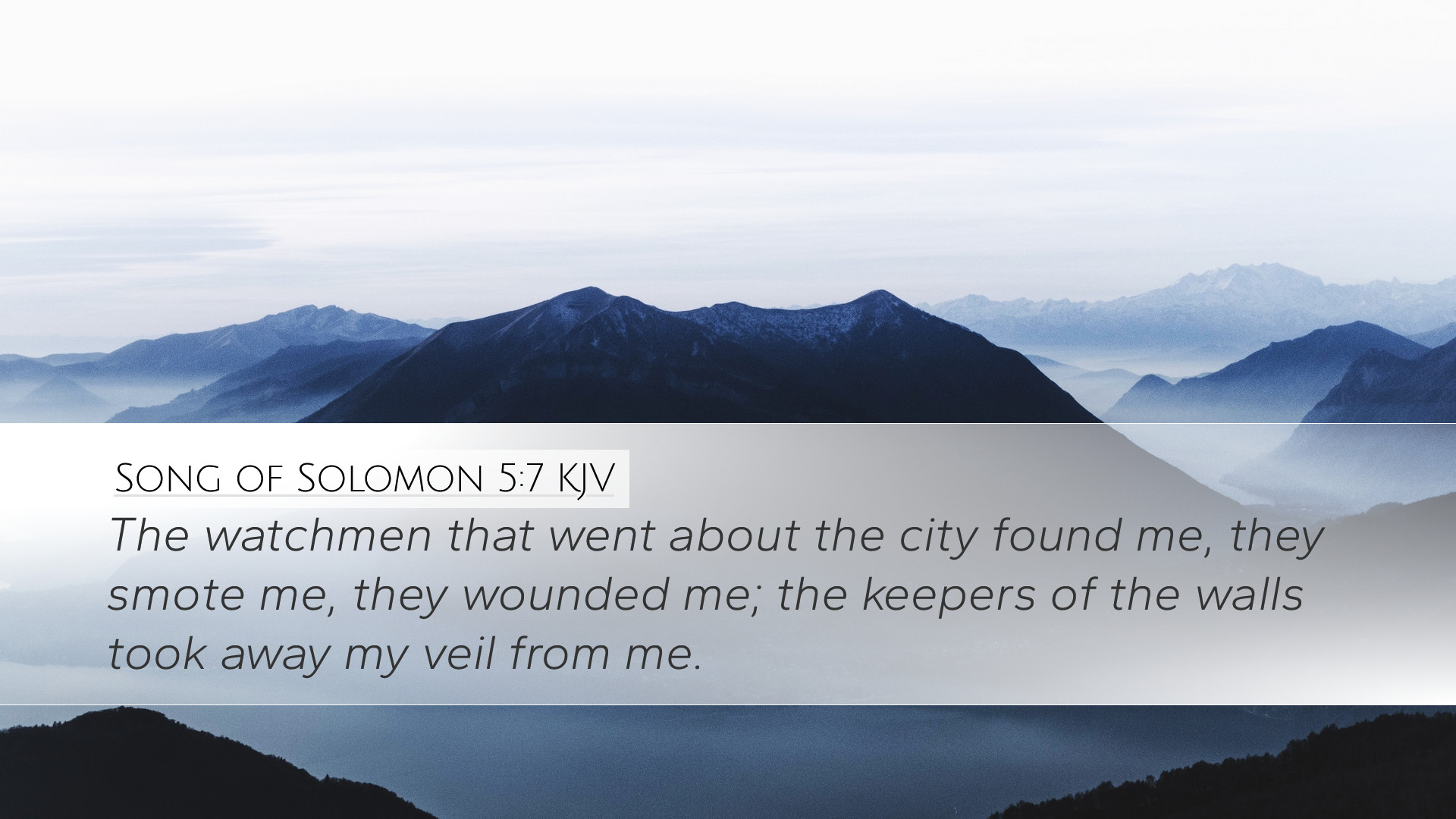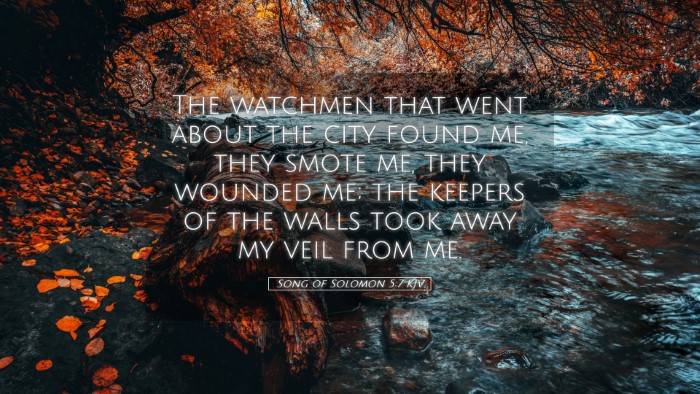Analysis of Song of Solomon 5:7
In Song of Solomon 5:7, the verse states:
"The watchmen that went about the city found me: they smote me, and wound me; the keepers of the walls took away my veil from me."
Context and Overview
The Song of Solomon, attributed to Solomon, serves as a rich tapestry of romantic and poetic imagery, exploring themes of love, desire, and longing. Within this particular verse, the narrative takes a dramatic turn, encapsulating feelings of hurt, vulnerability, and search amidst a backdrop of urban imagery.
Commentary Insights
Matthew Henry's Commentary
Matthew Henry interprets this verse within the context of the beloved's yearning and the distress that arises from longing. He observes:
- Watchmen as Temptations: The imagery of the watchmen suggests external forces that question and challenge the pursuit of love. The smiting and wounding symbolize the trials faced when one seeks genuine affection in a world filled with distractions.
- Loss of Dignity: The act of taking away the veil signifies a stripping away of dignity and personal barriers. Henry reflects on how love exposes vulnerability, leading to both beauty and pain.
Henry concludes that the beloved's experience is a metaphor for the soul's pursuit of Christ, often facing trials and tribulations as it attempts to remain faithful amidst a tumultuous world.
Albert Barnes' Notes on the Bible
Albert Barnes offers a nuanced reading of this verse, emphasizing the significance of the beloved's encounter with the watchmen:
- The Watchmen's Role: Barnes explains that the watchmen could represent societal norms or guardians of righteousness that may not understand or accept the personal, intimate nature of spiritual love.
- Physical and Spiritual Struggle: The 'smote and wound' metaphorically illustrates the conflict between the desire for love and societal constraints, with an emphasis on the inner struggle when one seeks divine connection amidst worldly judgments.
- Loss of Protection: The taking away of the veil can imply that in one's vulnerability, external elements can misinterpret the sincerity of their intentions. This represents how personal faith can be vulnerable to misunderstanding by others.
Barnes highlights that through perseverance in love, even amidst misunderstanding, a deeper understanding of divine love is achieved.
Adam Clarke's Commentary
Adam Clarke presents a deeper theological reflection on the verse, suggesting that:
- Symbolism of Urban Life: Clarke points out the urban setting of the beloved’s encounter with the watchmen, indicating a contrast between the city (often representing worldly temptations) and the private sanctuary of love.
- Experience of Rejection: The phrase 'they smote me, and wounded me' captures not just physical but emotionally taxing experiences in pursuing love. Clarke suggests this reflects the essence of seeking genuine relationships where pain can often accompany true desire.
- Metaphor for Christ's Suffering: Clarke draws parallels between the beloved's suffering and the suffering of Christ, indicating that the pursuit of love—particularly divine love—mutually entails suffering and joy.
Clarke’s interpretation underscores the transformative power of love and its capacity to endure, encouraging believers to embrace their own struggles with the knowledge that they reflect deeper truths of divine affection.
Theological Implications
This verse, while steeped in poetic metaphor, offers rich theological exploration. Pastors and theologians can extract valuable lessons on:
- The Nature of Love: The interplay of joy and pain in relationships, both earthly and divine, reminds believers that love often requires sacrifice.
- Vulnerability in Faith: The stripping away of the veil symbolizes the need for clarity and authenticity in one’s relationship with God—a theme that resonates profoundly in pastoral care and counseling.
- Community and Isolation: Encountering watchers or societal expectations highlights the communal aspect of faith, where love and individual faith journeys can lead to vulnerability.
Conclusion
Song of Solomon 5:7 presents a multi-layered exploration of love's journey, where external and internal struggles converge. The combined insights from Matthew Henry, Albert Barnes, and Adam Clarke provide a robust framework for understanding the profound implications of this verse. As pastors, students, and scholars reflect on these interpretations, they are encouraged to embrace the complexity of love and its many dimensions, recognizing that such experiences are integral to the human condition and spiritual life.


